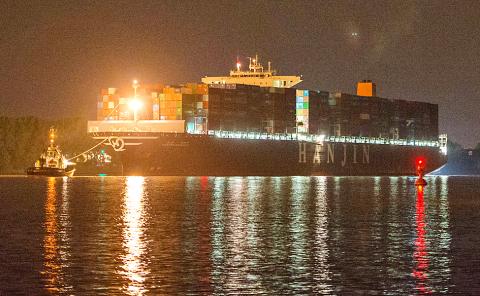Hyundai Merchant Marine Co, South Korea’s second-largest container line, surged in Seoul trading after the company was said to be looking at some assets of troubled rival Hanjin Shipping Co for a possible acquisition.
The stock jumped 6 percent to close at 8,700 won, the highest level since Sept. 8, helping to trim the decline this year to 70 percent.
Hanjin shares fell 12 percent to 955 won.

Photo: EPA
Financial institutions that provided money to Hanjin specifically to buy carriers have approached Hyundai Merchant for sale of its vessels, mostly container ships, people with direct knowledge of the matter said, asking not to be identified, as the talks are private.
Korea Development Bank — the largest shareholder of Hyundai Merchant and the biggest lender to Hanjin — and the Seoul Central District Court have been pushing to find a solution to the troubles at Hanjin, whose filing for bankruptcy protection last month has roiled the global supply-chain industry.
“The government is trying to make Hyundai Merchant more competitive by buying some of Hanjin’s assets,” said Park Moo-hyun, an analyst at Hana Financial Investment Co in Seoul. “If a purchase happens, we will have to wait and see how it can really help Hyundai Merchant.”
Hyundai Merchant is not aware of any specific reason for the stock’s surge yesterday, a spokesman said.
Separately, Hyundai Merchant intends to announce its long-term business plan in November, which could include reorganization of its structure and staff, another company spokesman said yesterday.
A.T. Kearney Inc, International Business Machines Corp and FM Associates are consulting the container line on the plan, he said.
Hyundai Merchant is in the midst of a creditor-led debt-restructuring program. Unlike Hanjin, it has managed to obtain financial help after meeting all requirements for funds, including adjusting charter rates.
State-run Korea Development Bank (KDB) is now the biggest shareholder of Hyundai Merchant after swapping debt for equity. KDB owns about 12 percent of the company, according to data compiled by Bloomberg.
Creditors and owners are stepping up efforts to help ease cargo disruptions resulting from boxes stuck on Hanjin’s stranded vessels. Last week, KDB said it would offer a credit line of 50 billion won (US$45 million) to Hanjin if funds previously pledged by the owners are insufficient to ease the situation.
“Hanjin Shipping selling assets will put a dent in its competitiveness,” said Cho Byung-hee, an analyst at Kiwoom Securities Co in Seoul. “This means the scope of its business is going to shrink from now.”
The government on Friday said that it would come up with a plan next month to help improve the competitiveness of the nation’s shipping industry.
The plan will focus on securing “affordable” vessels and the government might consider ordering new ships to enable Hyundai Merchant to handle exports, South Korean Vice Minister of Oceans and Fisheries Yoon Hag-bae said.

DIVIDED VIEWS: Although the Fed agreed on holding rates steady, some officials see no rate cuts for this year, while 10 policymakers foresee two or more cuts There are a lot of unknowns about the outlook for the economy and interest rates, but US Federal Reserve Chair Jerome Powell signaled at least one thing seems certain: Higher prices are coming. Fed policymakers voted unanimously to hold interest rates steady at a range of 4.25 percent to 4.50 percent for a fourth straight meeting on Wednesday, as they await clarity on whether tariffs would leave a one-time or more lasting mark on inflation. Powell said it is still unclear how much of the bill would fall on the shoulders of consumers, but he expects to learn more about tariffs

NOT JUSTIFIED: The bank’s governor said there would only be a rate cut if inflation falls below 1.5% and economic conditions deteriorate, which have not been detected The central bank yesterday kept its key interest rates unchanged for a fifth consecutive quarter, aligning with market expectations, while slightly lowering its inflation outlook amid signs of cooling price pressures. The move came after the US Federal Reserve held rates steady overnight, despite pressure from US President Donald Trump to cut borrowing costs. Central bank board members unanimously voted to maintain the discount rate at 2 percent, the secured loan rate at 2.375 percent and the overnight lending rate at 4.25 percent. “We consider the policy decision appropriate, although it suggests tightening leaning after factoring in slackening inflation and stable GDP growth,”

Greek tourism student Katerina quit within a month of starting work at a five-star hotel in Halkidiki, one of the country’s top destinations, because she said conditions were so dire. Beyond the bad pay, the 22-year-old said that her working and living conditions were “miserable and unacceptable.” Millions holiday in Greece every year, but its vital tourism industry is finding it harder and harder to recruit Greeks to look after them. “I was asked to work in any department of the hotel where there was a need, from service to cleaning,” said Katerina, a tourism and marketing student, who would

i Gasoline and diesel prices at fuel stations are this week to rise NT$0.1 per liter, as tensions in the Middle East pushed crude oil prices higher last week, CPC Corp, Taiwan (台灣中油) and Formosa Petrochemical Corp (台塑石化) said yesterday. International crude oil prices last week rose for the third consecutive week due to an escalating conflict between Israel and Iran, as the market is concerned that the situation in the Middle East might affect crude oil supply, CPC and Formosa said in separate statements. Front-month Brent crude oil futures — the international oil benchmark — rose 3.75 percent to settle at US$77.01